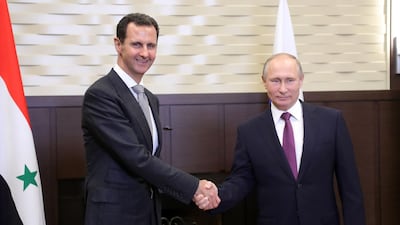There was a certain amount of weariness attending the preamble to United Nations peace talks on Syria, which began in Geneva today – a sort of been-there, seen-it-before sense of jadedness. Not simply because it was the eighth round of talks being held in a bid to end the nearly seven-year conflict but mainly because top of the agenda was whether Syrian government representatives would even bother turning up.
Yesterday the regime finally confirmed it would be coming tomorrow, a day after it was supposed to show. It demonstrates yet more contempt from Bashar Al Assad for his people, who are suffering intolerably while he holds sway over his country's future. All other parties are poised to reach a fair deal. Nasr Al Hariri, head of the Saudi-backed High Negotiation Committee umbrella opposition group, said it was "united and ready for real talks with the government". That is a tough pill to swallow for opposition leaders, who until recently were calling for Mr Al Assad's removal as non-negotiable. Up until they met in Riyadh a week ago, they could not see a way forward with the regime being involved in any way. Yet disparate opposition groups have managed to set aside their own differences to form a 36-member unified delegation and have come to the UN table without preconditions.
That is a huge conciliatory gesture, which has yet to be matched by the man responsible for untold suffering. The Syrian conflict has resulted in the deaths of more than 330,000 people, with millions being driven from their homes, equivalent to 40 per cent of the country. The UN has accused the Syrian government of launching sarin and chlorine attacks on its own people. The regime's barbarism has no place in the inclusive transitional government being proposed by the opposition. Yet despite their willingness to include him in talks and set aside their differences for a far more important cause – a fair deal for the Syrian people – he has not even bothered to turn up.
Mr Al Assad is not interested in looking after his people's best interests, only his own. Upholstered by Russian military enforcements and backed by the triumvirate of Russia, Iran and Turkey, which simultaneously held talks in Sochi last week attended by him, he is only interested in consolidating his power. His failure to even send representation on his behalf to the UN talks in Geneva yesterday demonstrates his sneering disregard for his critics. With 55 per cent of the country under his government's control once again, he is banking on a military solution to re-establish his regime's power, not one reached by delicate negotiations or any submission on his part. It is becoming increasingly clear that by pretending to engage in previous rounds of talks, he was giving them lip service alone.
The UN peace envoy helming the talks, Staffan de Mistura, said he suffered from chronic optimism. He is going to need it. It might be all the opposition has on its side.

